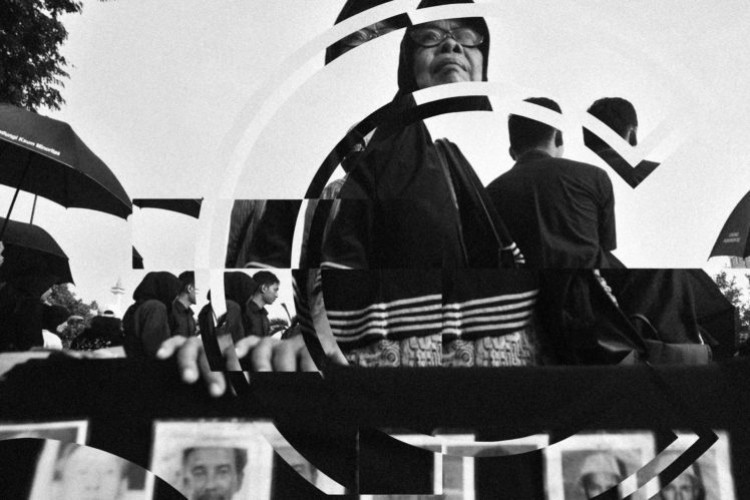
Fatia and Haris Taught Us to Fight and There Are Still “Battlegrounds” to Win
In this Open Column submission, Aldo Kaligis echoed the victory of Fatia-Haris’ case, and reminded us that the long, constant struggle towards true democracy is not over yet.
Words by Whiteboard Journal
Yesterday, amidst the shadows of uncertainty, a flicker of hope emerged as the East Jakarta District Court delivered a verdict that acquitted two Indonesian human rights defenders, Fatia Maulidiyanti and Haris Azhar, from all charges in a defamation case lodged by the Coordinating Minister on Maritime and Investment Affairs, Luhut Binsar Pandjaitan. This case, which had the potential to cast a long and chilling shadow over freedom of expression in Indonesia, took a surprising turn, offering a momentary relief to those advocating for human rights.
The charges against Fatia and Haris stemmed from their courageous dissemination of a report in August 2021, exposing Luhut’s alleged involvement in the illegal military deployment in mining concessions in Papua. A bold act of speaking truth to power, which in many countries would be lauded, found itself on trial in Indonesia under the draconian Electronic and Information Transactions (EIT) Law. The charges, including defamation under Article 27(3) of the EIT Law, were filed against them on March 17, 2022, after Luhut’s report in September 2021.
Many anticipated a different narrative yesterday. Speculations loomed large, predicting prison sentences of three and a half and four years for Fatia and Haris, respectively, based on the prosecutors’ demands. Such an outcome would have set a chilling precedent and signaled a grave threat to academic freedom and the peaceful exercise of free speech in Indonesia.
However, as the judges pronounced the duo not guilty of defaming Luhut, a wave of relief washed over the courtroom. Supporters, who had stood by Fatia and Haris in their fight for justice, erupted in cheers and shed tears of joy. It was a moment that seemed to echo the resilience of those standing against the suppression of dissent.
Yet, this victory must be approached with caution. When the judges questioned the prosecutors about their stance on the verdict, a cloud of uncertainty lingered. The prosecutors requested more time to “think” before deciding their next course of action. In the complex landscape of Indonesia’s judicial system, this leaves two possibilities open. Prosecutors might accept the verdict, or they could choose to appeal, transferring the case to the jurisdiction of the Jakarta High Court and potentially subjecting Fatia and Haris to a new set of trials.
Regrettably, the prosecutors wasted no time deliberating their next move. By approximately 6 PM, reports surfaced regarding their decision to appeal the verdict.
The very fact that this case reached trial underscores the ease with which criticism against those in power can be misconstrued as a personal attack. Laws like the EIT Law become tools to suppress dissent, creating a culture of fear that threatens the essence of democracy. They enable those in power to manipulate legislation to shield themselves from accountability.
Thus, the potential abuse of power by Luhut and the prosecutors’ failure to recognize the draconian nature of the EIT Law will continue to highlight a systemic issue—a disregard for human rights obligations—if and when an appeal is triggered. An appeal would not only signify an attempt to exploit legal loopholes but also underscore the lack of conscience within the prosecution system in upholding international standards. It would signal that Indonesia is either unwilling or unable to guarantee freedom of opinion and expression.
The prolonged criminalization of these human rights defenders has broader implications, reflecting a stark disconnect between Indonesia’s international human rights obligations and domestic rules and regulations. The EIT Law contradicts international standards ratified by Indonesia, such as those enshrined under the International Covenant on Civil and Political Rights (ICCPR), a covenant adopted through Law 12/2005 that binds Indonesia to uphold the right to freedom of expression, among others.
According to the ICCPR, information of legitimate public interest should not be suppressed, and public figures must be open to criticism. However, the EIT Law fails to meet these standards. The wording of Article 27(3) of the EIT Law and its accompanying explanatory clause lack a clear prohibition against using the law to silence research findings and objections directed at public figures, creating an environment where dissent is stifled, and those seeking accountability are punished. Social media, stickers, banners, graffiti, and academic research—peaceful expressions of dissent—remain at risk of being unnecessarily and disproportionately silenced if they offend those in positions of power.
In the face of these threats, it is imperative that prosecutors refrain from filing an appeal against the verdict by submitting a Deed of Appeal Revocation. An appeal, if and when initiated, would not only jeopardize the freedom of Fatia and Haris but would pose a grave risk to every Indonesian citizen, their friends, family, and loved ones.
It is high time for Indonesia to demonstrate a commitment to respecting, protecting, and fulfilling the human rights of all its citizens. The battle for freedom may have seen a momentary victory, but the war against oppression continues. The time to act is now before the ominous silence engulfs us all. Drop the appeal and accept the verdict.












